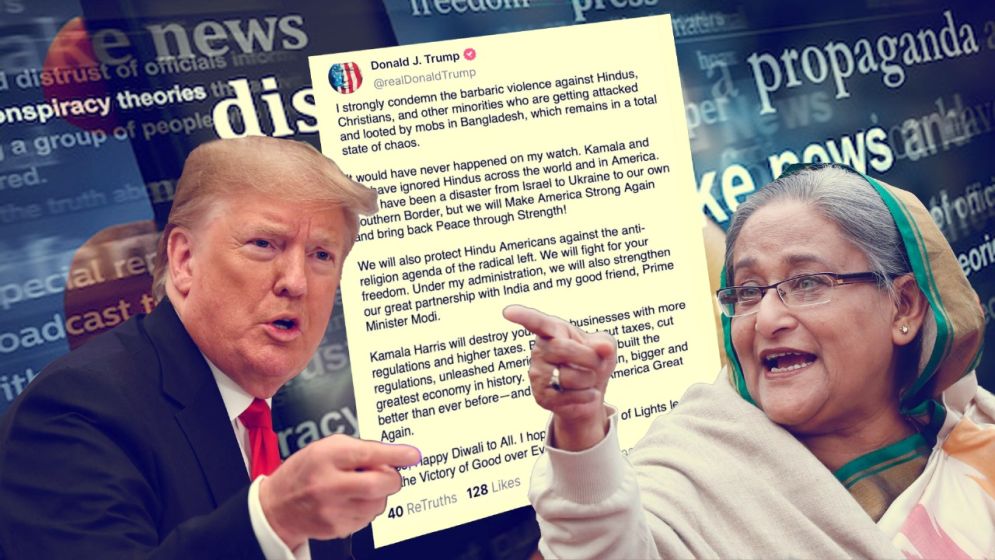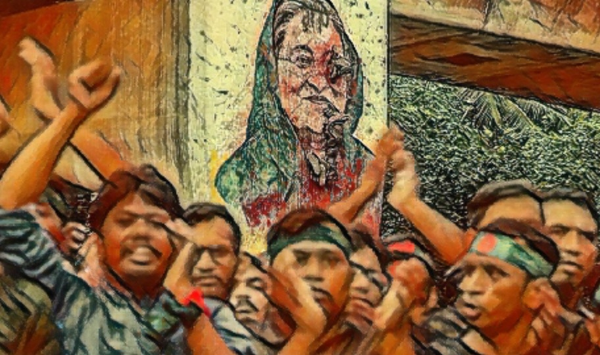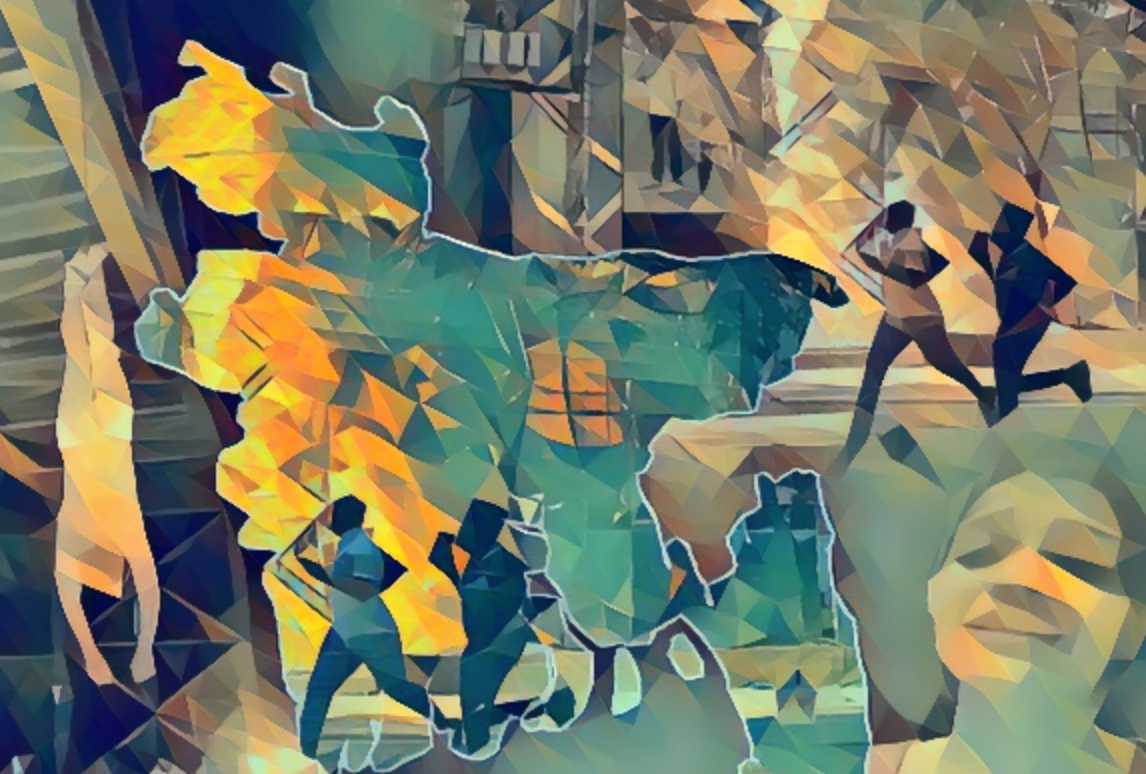Trump's tweet: Is it a misguided response to propaganda and disinformation from the ousted regime?

Former U.S. President Donald Trump recently ignited controversy with a tweet denouncing alleged violence against Hindu, Christian, and other minority communities in Bangladesh.
He painted a chaotic picture of religious persecution, suggesting widespread violence and a breakdown of law and order.
Although his tweet was brief, it sparked a flurry of reactions both in Bangladesh and internationally, with many questioning the validity and sources of his claims.
Unfortunately, his statements seem to be based on misinformation largely circulated by certain Indian media outlets and remnants of the ousted Awami League regime.
This highlights a troubling global issue: the danger of world leaders relying on distorted facts propagated by self-serving parties and propaganda sources.
For years, Bangladesh has been targeted by politically motivated media that sensationalize or misrepresent events, particularly those concerning communal harmony.
Despite the country’s strong record of religious tolerance, these media often portray isolated incidents as indicative of widespread societal problems.
Following the fall of the Awami League government on August 5, after the July Revolution led by students and citizens, Indian media appears to be amplifying claims of instability and religious conflict in Bangladesh, creating a narrative that diverges significantly from reality.
The ousted Awami League and its allies are desperately trying to maintain relevance by presenting a narrative of chaos and violence that does not accurately reflect the situation on the ground.
The role of propaganda media in shaping international perceptions of Bangladesh's internal matters is not new.
In recent years, reports from these outlets have frequently misrepresented the conditions of religious minorities in the country, making biased and exaggerated claims.
They often highlight selective incidents as evidence of systemic persecution while neglecting Bangladesh’s commitment to communal harmony.
By focusing on alleged violence and unrest without substantiation, such biased narratives foster misunderstanding, allowing tweets like Trump’s to gain traction.
This disinformation serves the interests of those who seek to undermine Bangladesh’s progress by sowing doubt about the nation’s dedication to religious coexistence.

Propaganda by the party of an ousted
dictator
While the origins of misinformation regarding Bangladesh’s religious tolerance can be traced back to vested interest groups, the current surge of misleading claims about communal violence has been amplified by supporters of the former Awami League regime.
After losing power, Awami League activists have escalated their efforts to misrepresent Bangladesh’s political and social landscape.
Many former leaders, anxious about their diminishing political relevance and potential accountability for past actions, have turned to lobbyists and PR firms abroad to portray Bangladesh as a chaotic nation.
By depicting the transition as tumultuous and alluding to alleged religious persecution, they aim to deflect attention from their own failures, corruption, and abuses during their time in office.
This manipulation not only damages Bangladesh’s reputation but also fosters unnecessary anxiety among minority communities both domestically and in the global diaspora.
Trump’s recent tweet is a direct consequence of these lobbying efforts. Influential yet misinformed voices have brought these distorted narratives to international platforms, impacting high-profile figures who are disconnected from the actual situation in Bangladesh.
In contrast, the reality in the country is quite different.
The interim government is committed to upholding democratic values and has actively worked to ensure the safety and rights of minority communities, even facilitating major religious celebrations like Durga Puja by providing additional holidays and security support.
Despite facing periodic challenges, Bangladesh has a rich tradition of maintaining communal harmony.
The society is characterized by inclusivity, with people from diverse religious backgrounds coexisting peacefully for generations.
Religious festivals such as Durga Puja, Eid, and Christmas are celebrated across communities, often with participation from individuals of all faiths.
Recently, Durga Puja, the most important Hindu festival in Bangladesh, concluded peacefully, underscoring the nation’s commitment to communal harmony.
Leaders from various political parties, including the Bangladesh Nationalist Party (BNP) and representatives from the interim government, have reaffirmed their dedication to the country’s non-communal values.
Statements and actions from pro-democracy stakeholders continue to prioritize the protection of religious harmony and the rights of minorities, showcasing Bangladesh as a model of inclusive, multicultural resilience.

Why does Trump's tweet completely
misrepresent Bangladesh?
Trump’s assertion that Bangladesh is rife with violence against minorities is not only factually inaccurate but also perilous.
Reports from various religious groups, along with assessments from national and international fact-checkers, indicate that communal incidents have been extremely rare, particularly since the political changes following the July Revolution of 2024.
Elbert P. Costa of the Bangladesh Christian Association noted that inflammatory remarks from influential leaders can provoke unrest.
He clarified that, since August 5, there have been no incidents targeting Christians in Bangladesh, aside from two isolated occurrences linked to political allies of the former government.
Costa emphasized that these incidents were politically motivated rather than communal, and that Bangladesh has remained peaceful and dedicated to interfaith harmony.
His response to Trump’s tweet highlights that such statements could be exploited by supporters of the ousted regime, potentially fostering an atmosphere of suspicion and discord.
World leaders have a responsibility to ensure that their statements, especially regarding the internal affairs of other nations, are based on verified information rather than hearsay or propaganda.
It is crucial for leaders to understand the risks of relying on unverified information, particularly when it pertains to sensitive issues like communal harmony.
Building constructive global relationships requires a foundation rooted in reality, free from the influence of propaganda.
Leaders should refrain from making broad claims based on distorted perspectives, as this misleads international audiences and can damage the reputation of nations that prioritize peace and tolerance.
The people of Bangladesh, as evidenced by their commitment to democracy and communal harmony, value meaningful international engagement grounded in truth.
They welcome insightful commentary on their progress and challenges, but such evaluations must be based on facts rather than misinformation.
While the country appreciates the goodwill of global leaders, its citizens are also cautious of attempts to undermine their societal values through ill-informed statements.
The people of Bangladesh have demonstrated a strong commitment to defending and preserving communal harmony, which is an essential aspect of the nation's identity.
—-
H. M. Nazmul Alam is an Eminent Academic, Journalist, and Political Analyst

